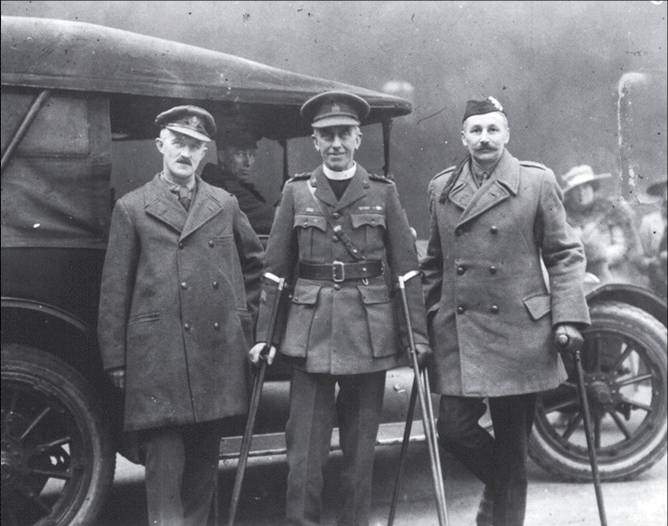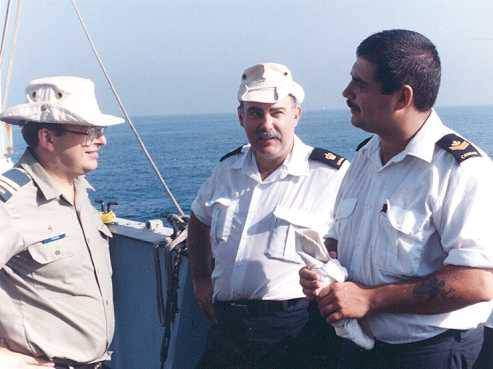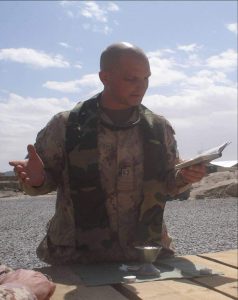Origins of the Anglican Military Ordinariate

Bishop Wells (Anglican) and Bishop Nelligan (Roman Catholic) were asked by the Canadian Government on the 1st of October 1939 to develop a Roman Catholic and Protestant Chaplain Service to the Canadian Armed Forces. Over the course of time many chaplains have served God and God’s people with distinction. In today’s Royal Canadian Chaplain Service, chaplains find themselves ministering in a totally interfaith and ecumenical environment that represents the faith groups of the world. The Royal Canadian Chaplain Service is the only Branch of the Canadian Armed Forces with the mandate to provide both spiritual and pastoral care to all service members and their families.
House of Bishops’ Statement on Chaplains to the Canadian Armed Forces
The following resolution was passed at the August 1977 meeting of the Canadian House of Bishops: “That this House of Bishops re-affirm the following Statement of Policy passed by the House at its meeting May 7-8, 1972, with respect to the Chaplain Service and the House of Bishops.”
Statement of Policy

In the light of the development of this area of the Church’s work over the years, the following statement of policy is submitted for the consideration of the House:
- A priest going into full-time ministry in the Canadian Armed Forces Chaplain Branch shall be recognized as serving in a special and in some ways unique area of ministry and administration.
- A Chaplain will be retained on the clergy list of his/her home Diocese as “On Leave to the Canadian Armed Forces Chaplain Branch”.
- Letters Testimonial will be issued by the Bishop of his/her Diocese to the Anglican Bishop Ordinary to the Canadian Armed Forces.
- The Anglican Bishop Ordinary to the Canadian Armed Forces on receipt of the Letters Testimonial shall issue a license authorizing such Chaplain to serve as a priest of the Anglican Church of Canada in the Canadian Armed Forces.
- The Chaplains are urged to maintain as fully as possible a link of communication and concern between the Chaplain and his/her home Diocese.
- Considers that the responsibility of the Anglican Bishop Ordinary to the Canadian Armed Forces is for the Episcopal care of the Anglican Clergy and Laity who live within the Armed Forces Community within and beyond the borders of Canada. Anglican Clergy in the Chaplain Branch serve under the Episcopal jurisdiction during their time of service of the Anglican Bishop Ordinary to the Canadian Armed Forces. Episcopal care should involve the periodic visit of the Anglican Bishop Ordinary to the places where his/her people live. It is assumed that the Anglican Bishop Ordinary will visit Bases/Wings/Formations for the purpose of conducting Confirmation Services or other Episcopal acts by right in consultation with Diocesan Bishops. It is expected that chaplains will normally look to the Anglican Bishop Ordinary for the exercise of hi/hers Episcopal ministry. Problems of time and distance will sometimes make it impossible for the Anglican Bishop Ordinary to fulfil all the requirements, in which case a local Bishop should be called upon.
 The Anglican Bishop Ordinary will be the official representative of the Anglican Church of Canada on the Interfaith Committee on Canadian Military Chaplaincy (ICCMC).
The Anglican Bishop Ordinary will be the official representative of the Anglican Church of Canada on the Interfaith Committee on Canadian Military Chaplaincy (ICCMC).- The General Synod of the Anglican Church of Canada has assigned Episcopal jurisdiction in the Canadian Armed Forces to the Anglican Bishop Ordinary and has made him/her responsible for ensuring that Episcopal ministrations are provided for all Anglican personnel and their families who reside on all Bases/Wings/Formations. Through the Staff Officer of the ICCMC, members of Clericus will endeavour to ensure that the Anglican Bishop Ordinary is invited at least once in a calendar year.
Note:
- The Canadian Forces Chaplain Branch was renamed the Royal Canadian Chaplain Service on 16 October 2014.
